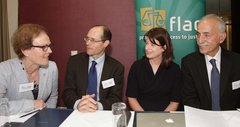International event examines impact of austerity on basic rights
14 May 2015

Human rights organisations from all over Europe and Irish bodies working on economic, social and cultural rights issues are meeting in Dublin this morning to examine how human rights have been challenged over the period of austerity.
The opening session of a two-day conference on Protecting Human Rights in Austerity includes interventions from ProfOlivier De Schutter of the UN Committee on Economic, Social and Cultural Rights and Emily Logan, Chief Commissioner of the Irish Human Rights and Equality Commission, on the challenges to human rights in Europe posed by austerity. The UN Committee will question an Irish government delegation led by Minister Sean Sherlock on the state’s performance under the international Covenant in Geneva next month.
FIDH President Karim Lahidji said: “ As human rights are increasingly sacrificed across Europe to a political ad economic agenda that simply ignores them, it is crucial that European civil society gets together and sends a strong message to decision-makers: You can no longer implement austerity policies without taking into account the devastating impact these can have on human rights. Consequences can be too dramatic, as we recently saw in Greece.”
The event presented a unique opportunity for organisations in Ireland and other seven countries in Europe to talk about issues of mutual concern as well as discussing tools for change, particularly from organisations working for social justice, said FLAC Director General Noeline Blackwell.
“It is also particularly helpful to have a session looking at the role of the European Union in how austerity was imposed and how that impacted on human rights, especially the right to health, housing, education, cultural life, work and social security. We have speakers from austerity affected countries such as Greece and Spain with strong testimony on how undiluted austerity programmes can do lasting damage to the social infrastructure of a country, which is of great interest especially to an Irish audience,” she said.
“Economic and social rights have particularly suffered from the restrictions imposed by austerity. However, these rights are not the only ones to be affected. Civil and political rights are also under threat,” added Mr Lahidji.“It is our responsibility, as civil society organisations, to denounce the situation and to prevent Europe from trading off the democratic principles on which it is built”.
The event, which involves member organisations of FIDH from Europe as well as invited Irish social justice organisations and international experts, also features a discussion on the mechanisms available to civil society for the protection of ESC rights in the region. Irish organisations taking part in the conference include tenants’ rights organisation Threshold, the Irish Heart Foundation, the Irish National Organisation of the Unemployed, disability rights champions Inclusion Ireland and legal rights group Community Law & Mediation.
In addition, Ballymun Community Law Centre will be showcasing a mechanism using the European Social Charter that, with other housing rights groups, it is employing to enforce the rights of local authority tenants in estates all over the country, in cooperation with FIDH.
#HRinAusterity
/ENDS
Editors’ notes:
1. The International Federation for Human Rights, known by its French acronym FIDH, is an international human rights NGO representing 178 organizations from close to 120 countries. Since 1922, FIDH has been defending all civil, political, economic, social and cultural rights as set out in the Universal Declaration for Human Rights.
2. FLAC (Free Legal Advice Centres) is a human rights organisation which exists to promote equal access to justice for all. FLAC is an NGO that relies on a combination of statutory funding, contributions from the legal professions and donations from individuals and grant-making foundations to support its work. FLAC’s project, PILA (Public Interest Law Alliance), matches social justice legal need to pro bono legal assistance, and coordinated the Irish civil society response.
3. A conference programme is available at http://flac.ie/download/doc/
fidhflac_seminar_protecting_ human_rights_in_austerity_ final_agenda.doc 4. The International Covenant on Economic, Social and Cultural Rights protects rights to health, housing, work, education, family life, social security, cultural life and adequate living standards. The UN is conducting its Periodic Review of Ireland’s compliance with the Covenant, culminating in a formal examination in Geneva on 8-9 June. A civil society delegation will also be there to present a civil society view on that performance and to highlight issues of particular concern, as outlined in the civil society report, Our Voice Our Rights at www.ourvoiceourrights.ie .
5. The civil society Update, covering evidence and data from 1 October 2014 to 1 May 2015 and submitted to the UN on 8 May, is also available to download at http://www.ourvoiceourrights.
ie/resources/update-to-our- voice-our-rights-may-2015/